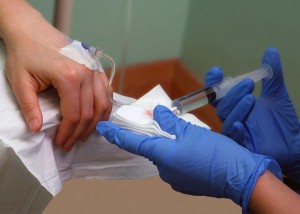Cancer Today
April 15, 2014
Cancer is not the death sentence it used to be, but for many Americans, it’s still one of the largest killers. In fact, according to a 2011 report from the Center for Disease Control, cancer ranks in as the number 2 cause of death in the United States, just under heart disease. With reports of new treatments ever present in media, the Independent takes a close look at the current state of the disease with insights from NEIU professors.

Dr. Cindy Voisine, professor of biology at NEIU, describes cancer, not as a singular affliction, but a collection of several diseases. “Cancer is one name for many different problems. Cells keep on dividing uncontrollably… they’re not listening to their community [the other cells around it].”
Risk and Treatment.
Dr. Shubhangee Mungre, professor of biology at NEIU, said, “People are more aware of risk factors for cancer and more people are living a healthier lifestyle.” Media coverage has helped them acquire knowledge about this topic.
According to the National Cancer Institute, the causes for cancer include smoking, exposure to sunlight or other types of radiation, genetics, poor diet, and lack of physical activity. “Every cancer is different. There are hundreds of reasons for cancer,” said Dr. Voisine. She also explained that the BRCA mutated gene occurs in breast cancer, and 50% of all cancers have a P53 mutation which is located on the 17th chromosome.
“Cancer cells develop resistance to drugs and do not respond to therapy. New immunological approaches are being developed and used for some such cases. The patents’ immune cells are collected, modified to recognize and destroy cancer cells specifically, so that normal body cells are not harmed,” said Dr. Mungre.
Hitting Close to Home
Cancer is not always facts and figures; it affects the person’s lifestyle and the person’s family. Dr. Mungre said, “Cancer affects all aspects of life. The medical problems related to cancer, [the] side effects of treatments can affect the outlook of the patient.” She said, “People may get depressed, stressed and anxious…Also, the family, along with the patient, the primary caregiver is affected as well.”
This can be attested by Dr. Paloma Vargas who works in Student Center for Science Engagement. “My mother was diagnosed with stage III breast cancer a year ago. So, the diagnosis was a big shock and unexpected,” said Dr. Vargas. “My mom is fairly young, so this was very surprising, and it felt like it came out of the blue.”
Dr. Vargas continued, “I think being diagnosed with breast cancer is when you find out who your friends really are and how much your family members really love you. It changes; having cancer changes the dynamic of any relationship.”
Seeking Help
Cancer, if caught early enough, is largely treatable. That’s why organizations such as the World Health Organizations (WHO), the American Cancer Society (ACS) and the National Cancer Institute (NCI) all encourage regular checkups. According to the ACS’s website, “Treatment works best when cancer is found early—while it’s still small and is less likely to have spread to other parts of the body. This often means a better chance for a cure, especially if the cancer can be removed with surgery.”







